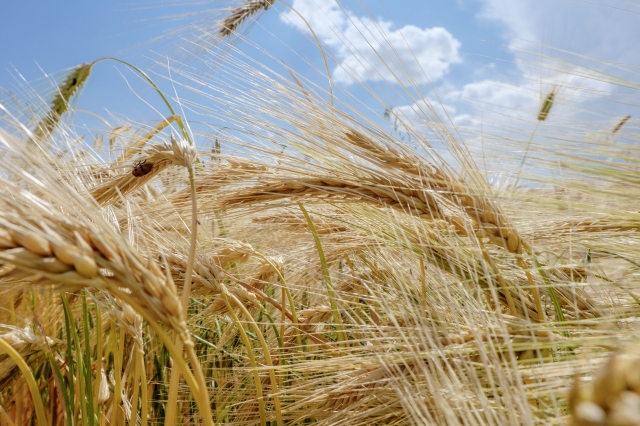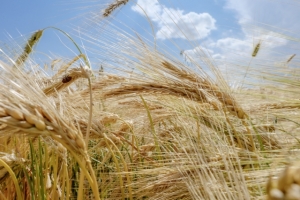From Golden Crops to Green Schools
Green urban development, environmental education and sustainable agriculture are in the focus of the local projects supported by the United Nations Development Programme (UNDP) and the Global Environment Facility (GEF) in different regions of Georgia. Aiming to address the critical environmental issues which have a direct impact on people’s lives, civil society and community organizations across the country are working with people directly to protect unique landscapes, promote sustainable farming, restore and preserve biodiversity and engage children in environmental education. These local projects are part of the GEF Small Grants Programme implemented by UNDP in cooperation with the Ministry of Environmental Protection and Agriculture of Georgia.
UNDP Head Louisa Vinton and Deputy Minister of Environmental Protection and Agriculture Nino Tandilashvili visited the village of Asureti today to take part in the harvest of Georgian endemic wheat varieties – Dika and Shavpkha – that are being preserved and cultivated by the Association of Georgian Wheat Growers.
With UNDP and GEF support, the Association regenerated endemic and landrace seeds in nursery plots to grow these unique grains on up to 50 hectares of land. In addition, training and consultation were provided to wheat growers aiming to engage more farmers in reviving and preserving Georgia’s agricultural heritage.
Georgia’s landrace and endemic wheat, praised for its agricultural resilience, nutritive value and flavour profiles, is attracting growing attention from wheat producers and bread-bakers. Regeneration of these unique grains is listed as a priority in Georgia’s Biodiversity Strategy and Action Plan and Agriculture Development Strategy. Some of the endangered wheat varieties were submitted for nomination to the UNESCO Lists of Intangible Cultural Heritage.
“Georgia’s agricultural tradition goes back thousands of years,” said Deputy Minister Tandilashvili. “As we are developing 21st-century agriculture, founded on the principles of sustainable farming and modern technologies, we can breathe new life into endemic wheat varieties to benefit Georgian farmers and preserve our rich biodiversity.”
“The pandemic and the visible destruction caused by climate change offer proof that we have pushed the limits of nature too far,” said UNDP Head Louisa Vinton. “Programs like this show us hands-on ways that we can try to restore balance, building green models of sustainability in partnership with local communities and organizations.”
Earlier in July, Vinton visited school gardens organised in three secondary schools in Tbilisi with UNDP and GEF support. Aiming to promote environmental education and increase urban green spaces, the “Child and the Environment” association teamed up with school authorities and the administration of the Saburtalo district of Tbilisi. The project provides some 150 school children – 50 of whom are children without parental care – with an opportunity to relax in a green oasis during the school day, learn how to take care of plants and grow their own fruits and vegetables.
Since its launch in Georgia in 2012, the GEF Small Grants Programme has funded 71 environmental initiatives with a total value exceeding USD 1.6 million. Along with the environmental benefits, these local projects contribute to the reduction of rural poverty, improvement of livelihoods, gender equality and education.












